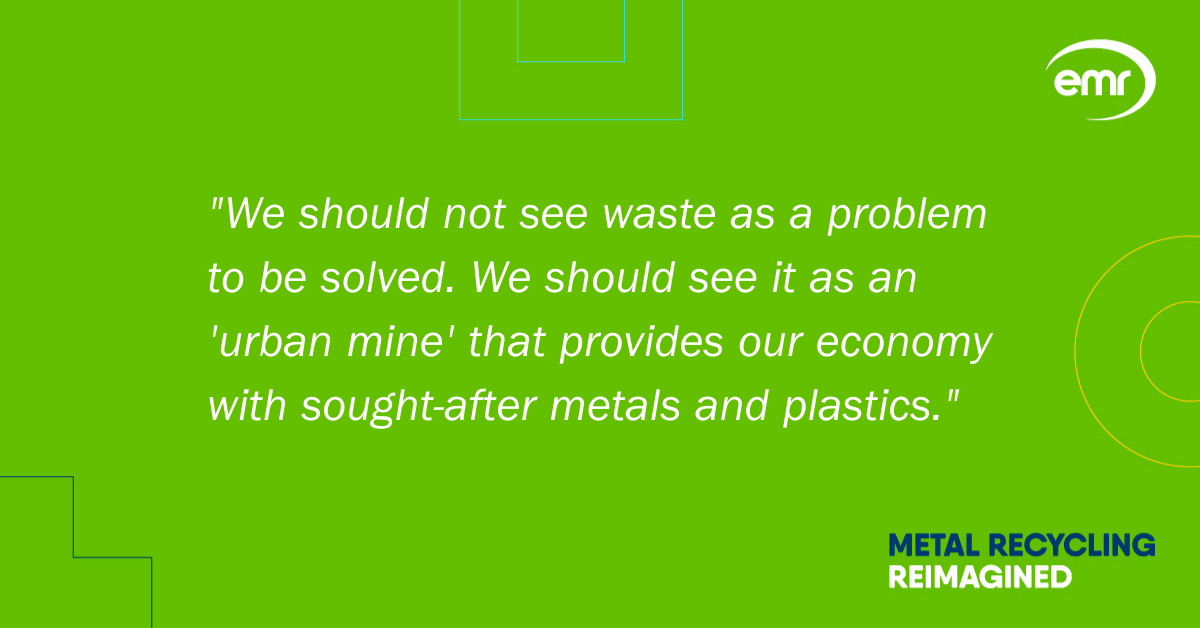At the heart of EMR’s plans to become a global leader in sustainable recycling are the products we deliver to manufacturers – from ferrous and non-ferrous metals to plastics. These will help create the next generation of consumer goods and building materials.

EMR’s processing operations currently represent nearly 20 percent of our carbon emissions. As part of the Our Decade of Action Strategy laid out in 2020, we have outlined the actions we will take within the next ten years to help reach our goal of being a net-zero business by 2040. This is how we will play our part in the creation of a truly circular economy.
To do this, EMR must invest and innovate in the way it processes the material that arrives at its sites every day.
Thanks to a family-owned business model which reinvests 99 percent of profits back into the business each year, EMR is well placed to make this investment and we are doing so across our business.
One area where we constantly seek improvement is in the quality, grade and purity of the materials we produce to enable steel makers and manufacturers to use more recycled material in the future. Across the supply chain there is an understanding that we need to hit net-zero and, equally, keep more of our resources close to home.
This is why the opportunity for EMR to work with local UK steel makers and users to produce high-quality green steel for a range of applications, which have previously relied on virgin material, is so exciting for our business. We are working increasingly closely with all parts of the steel supply chain in the UK to help them find new ways to use recycled materials in their products. This helps them to reduce the carbon impact of their finished buildings, cars and other products.
This is just one example of a new attitude to what we do at EMR. We should not see waste as a problem to be solved. We should see it as an “urban mine” that provides our economy with sought-after metals and plastics. EMR and other companies in the recycling sector are mining that resource and providing sustainable materials to the rest of the economy.
Some of EMR’s most eye-catching recent innovations will capture, process and re-use rare-earth metals that exist in the electronics which power our modern world.
REAP (Rare-Earth Extraction from Audio Products) is a project, launched last year, that aims to recycle the high-strength rare-earth magnets which exist in loudspeakers. In partnership with the University of Birmingham and Hypermag Ltd, this project will help the UK to recover valuable neodymium that would otherwise be lost, ready to be re-used in new products.
The processes developed in this project will have many applications, including in the recycling of cars, where rare-earth magnets are used in electronic seat adjusters and window motors.
This is just one project EMR is working on to improve and diversify the processes we use. Currently we’re also working in partnership with academia and the car industry as part of the RECOVAS project to build a new supply chain for end-of-life electric vehicle batteries. While our plastics division, MBA Polymers, is exploring ways to improve the sorting and recycling of the huge quantities of waste plastic the UK produces each year.
Underpinning this work is a team of world-leading engineers and scientists at EMR.
In the years ahead, visitors to EMR sites will also see huge advances in the way we work too.
This includes investing in IT systems that utilise artificial intelligence and machine learning to improve the way we grade scrap or to reduce impurities. EMR can benefit from advances in many other industries such as the application of AI in finding tumours on X-rays. Technologically speaking this isn’t too different to the challenge of finding and sorting metals on a conveyor belt.
Read about our sustainability commitments and our plan to be net-zero by 2040.